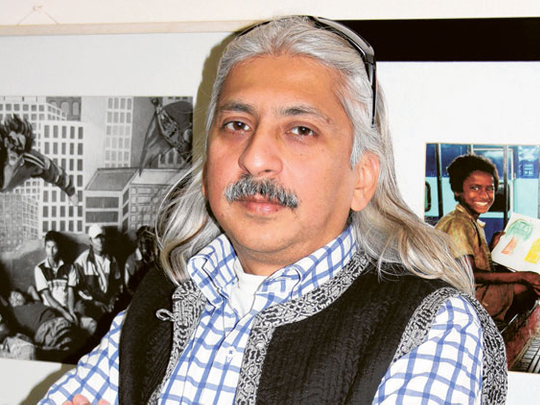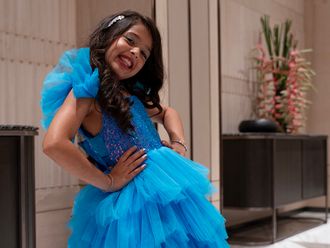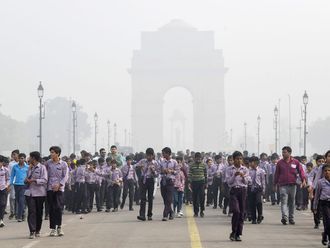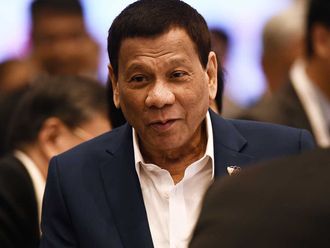
New Delhi To Sanjoy Roy goes the credit of holding the most prestigious celebration of both national and international authors at the Jaipur Literature Festival (JLF) year after year.
He is the managing director of Teamwork Films that organises different kinds of festivals across the world. With offices in New Delhi, Hong Kong, Singapore, London and Johannesburg, Roy travels extensively making the shows a grand success.
Having directed and produced a wide range of films and television shows, Roy has received the National Award for Excellence and also the IDPA (Indian Documentary Producers Association) award for Best Documentary and Best Direction for his film Shahjahanabad.
The transition from films to festivals happened in 1999, when he held the first arts festival at Edinburgh. Since then, Teamwork has organised 19 annual arts and literature festivals in 11 countries and 21 cities.
He speaks exclusively to Gulf News.
Gulf News: Is it correct that since 2008 the footfalls at the JLF have risen from a few thousand to several thousand?
Sanjoy Roy: In the first year it was 7,000 people and this year it was 122,000 footfalls. I attribute it all to the city of Jaipur, which is presently being taught as a case study at the Harvard Business School because of its immense success. It's an unusual place in itself and the Diggy Palace represents romance, beauty and the old world charm that mesmerises people.
How have you managed to hold the most prestigious celebration of national and international authors?
We are an incredible team comprising William Dalrymple, who has access to prestigious writers and authors and takes care of the international list. And Namita Gokhale, who prepares the great Indian list. So, JLF was one of those things waiting to happen, where we had both national and international people coming together.
Would you say that accusations of the glamour driven festival being too focused on famous UK and US-based writers are baseless?
In a programme of 250 authors, maybe, just about 10 per cent are hugely famous names. The others could be known, but not read much. The magic of Jaipur festival now is that we discover incredible writing by people who one may not otherwise encounter. Unfortunately, the media focuses only on big names. And if the focus is on writers from the UK and the US, it is primarily due to the English language, although we do have writers from South Africa, Japan, China, Indonesia, Sri Lanka, Bangladesh, Nepal, Pakistan and Afghanistan. We try and ensure there is representation from across the world. But yes, there is emphasis upon the English language because that's the language of communication at the festival. There tends to be a bias at that level.
How did you stick with the policy of ‘every invitee is equal' — from the US Ambassador to a small-time writer?
This is something we had decided at the outset of holding the festivals. As a philosophy, we practice this through all our festivals. We feel that everyone who comes is equally important, as they have taken time out to be with us. Now people accept that if they are there, they are of equal importance.
Was it a conscious decision to invite the American talk show hostess Oprah Winfrey? Was it done to get the American audience?
It happened by accident. She was supposed to visit India with motivational guru Deepak Chopra, who we had invited. So he asked us if we would like to invite her. Now, who wouldn't be happy to invite someone who has done so much for literature? In America, if Oprah endorses a book, her reading club is able to sell thousands of copies. She is a phenomenon when it comes to converting Americans into readers. For that reason, we willingly invited her.
How difficult was it to handle the Salman Rushdie affair?
It was very difficult. The festival was on, yet all our attention was focused on managing the crisis, which was at many levels. Several groups in the city were making threats due to which security became a prime concern. India was having elections in the state of Uttar Pradesh and the crisis was also at the political level and people had vested interest in trying to create a controversy. It distracted us from the festival, though I don't think it made any difference to the people there. But yes, it did make a difference to Rushdie, who couldn't attend the festival. Since some groups threatened destruction if Rushdie attended, it caused unnecessary trouble. But Rushdie is visiting now and it is not affecting anyone.
Was there any political pressure on you not to invite Rushdie?
No, nothing of the sort. But there was so much unrest at the ground level with many Muslim organisations coming and asking us to withdraw the invitation to him. But we refused. This was done on the grounds that if we withdraw the invitation because of their pressure, the next day there would be another group putting another kind of pressure. So, although they said they would protest, though peacefully, there were also some groups that threatened violence. It was a miracle that everything passed off peacefully.
Were you unhappy that British author Hari Kunzru hijacked the festival's agenda by reading the lines from Rushdie's book The Satanic Verses?
He was propelled by what he thought was the right thing to do as per his conscience. Kunzru comes from a PEN background and they do support the freedom of speech. And he was speaking for a voice that couldn't be heard. He was making a statement, which everyone in any kind of right-minded situation must support. Freedom of speech is paramount.
Besides the JLF what are the other festivals you are involved with? What do you wish to achieve?
We hold festivals on art, music and literature in Singapore, Indonesia, Hong Kong, South Africa, America, Canada, France, Germany and Italy. The purpose is to create a platform for the arts. India has so much talent, but not enough platforms to showcase it across the world. We organise these festivals to attract the maximum number of people and try to make them as popular as possible.
Sanjoy Roy's Career: Timeline of important dates
- Sanjoy Roy was born on March 16, 1962, in Kolkata to mother Aparajita and father Admiral M K Roy.
- He completed his education from St Stephen's College, University of Delhi.
- Took primary training from a theatre company called Theatre Action Group (TAG) run by Barry John — 1981-86.
- His first job was with film producer and director Bobby Bedi — 1986.
- Set up Teamwork Films along with management consultant Mohit Satyanand in 1988.












